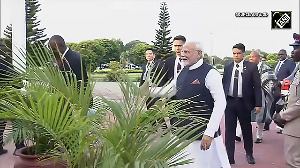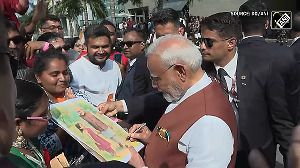If Pakistani President Pervez Musharraf wins the October 6 presidential polls and keeps his pledge to remove his uniform, a westernised, chain-smoking 'spy' could soon become the most powerful man in the country, a media report has said
Musharraf is widely believed to have chosen former ISI chief Lt Gen Ashfaq Pervez Kiyani as his successor to head the Army, says Newsweek in its upcoming issue.
Though Kiyani has always kept a low public profile, people who have worked closely with him speak highly of his abilities -- more highly in some cases than his boss might like, the magazine said.
"Kiyani is not only a strong commander, he's the most competent candidate by far," a Western military official in Islamabad was quoted as saying.
The Pentagon, Newsweek says, wants him to turn much of Pakistan's military into a counter-insurgency force, trained and equipped to combat al Qaeda and its extremist supporters along the Afghan border.
As a civilian head of state, Musharraf will need a strong, capable top officer who can revive the fighting spirit of a badly demoralised army, the report says, noting that in the last two months, suicide bombers have relentlessly attacked army convoys, camps, mess halls and mosques.
The extremists have killed more than 200 Pakistani soldiers, and tribal militants have captured more than 250 others as hostages.
"The Army has had its butt kicked in the tribal area," the Western military official was quoted as saying.
"But I'm optimistic that if Musharraf's choice is Kiyani, he can start to turn the Army around."
In 2003, the magazine recalls, when members of the armed forces were implicated in two assassination attempts against Musharraf, the president put Kiyani in charge of the investigation and applauded the way he got the country's rival intelligence services working together for a change.
"When Kiyani got tough, the problems of coordination disappeared and the agencies started working like a well-oiled machine," Musharraf recalls in his memoir In the Line of Fire.
Within months, Kiyani had unravelled the two plots and arrested most of the participants. He was rewarded in 2004 with a promotion to chief of ISI, and the next year his agency scored big with the arrest of Abu Faraj al-Libbi, the senior al Qaeda lieutenant who masterminded the attempts on Musharraf's life.
A former US intelligence official who dealt personally with Kiyani was quoted as saying that the ISI "took a lot of bad guys down" under his leadership. Kiyani has earned his boss's confidence, even serving as Musharraf's personal envoy in recent talks with exiled opposition leader Benazir Bhutto.
Kiyani has a tendency to mumble, but he speaks to Musharraf in a way few other senior officers would dare, the magazine said and quoted western military officials as saying that he told the president he would accept nothing less than the top job in the army.
Musharraf refusal to step down as army chief has seriously raised public hostility toward the armed forces. If Kiyani succeeds in restoring its reputation, he is likely to get the credit, not the president, said the report.






